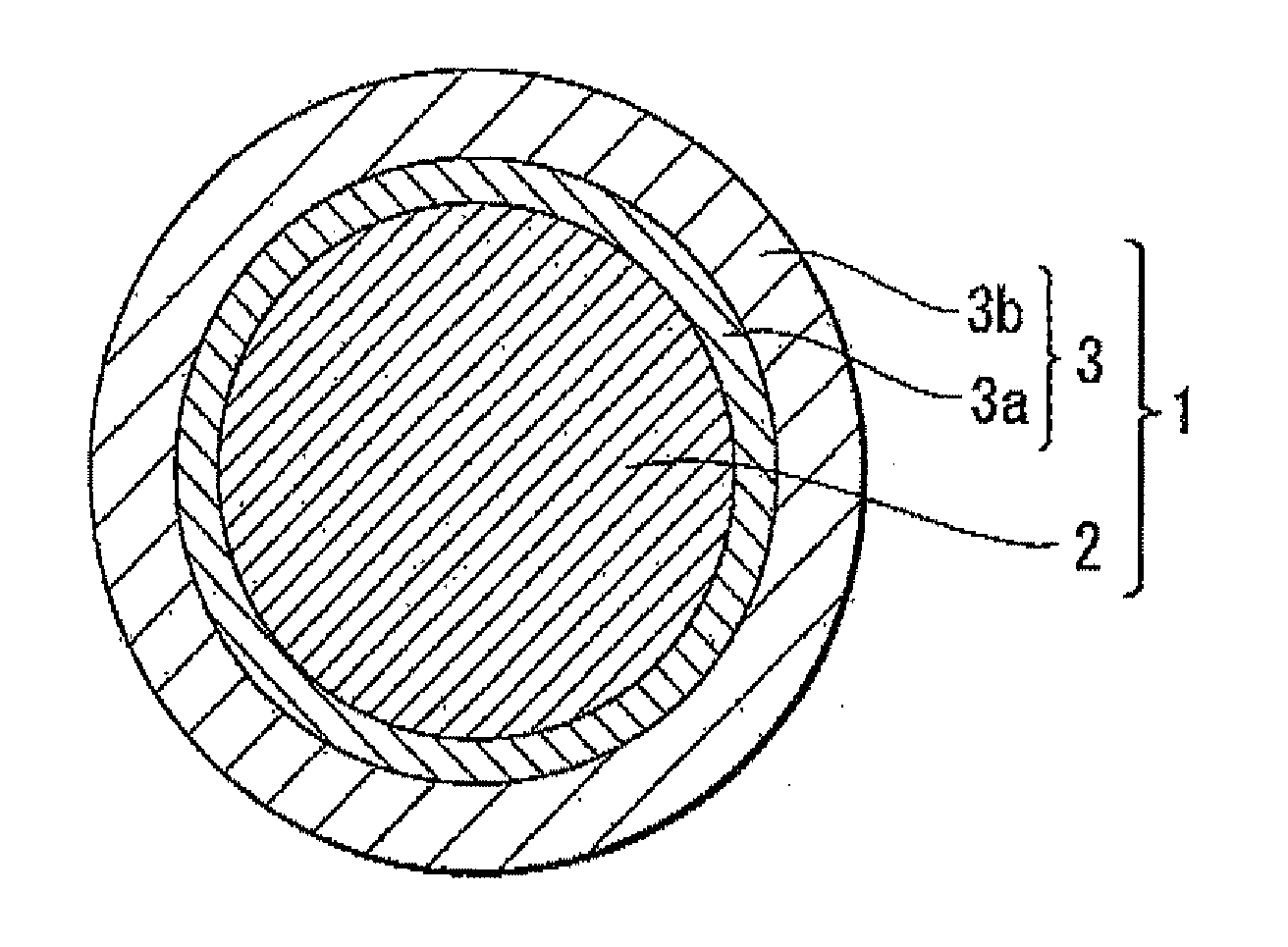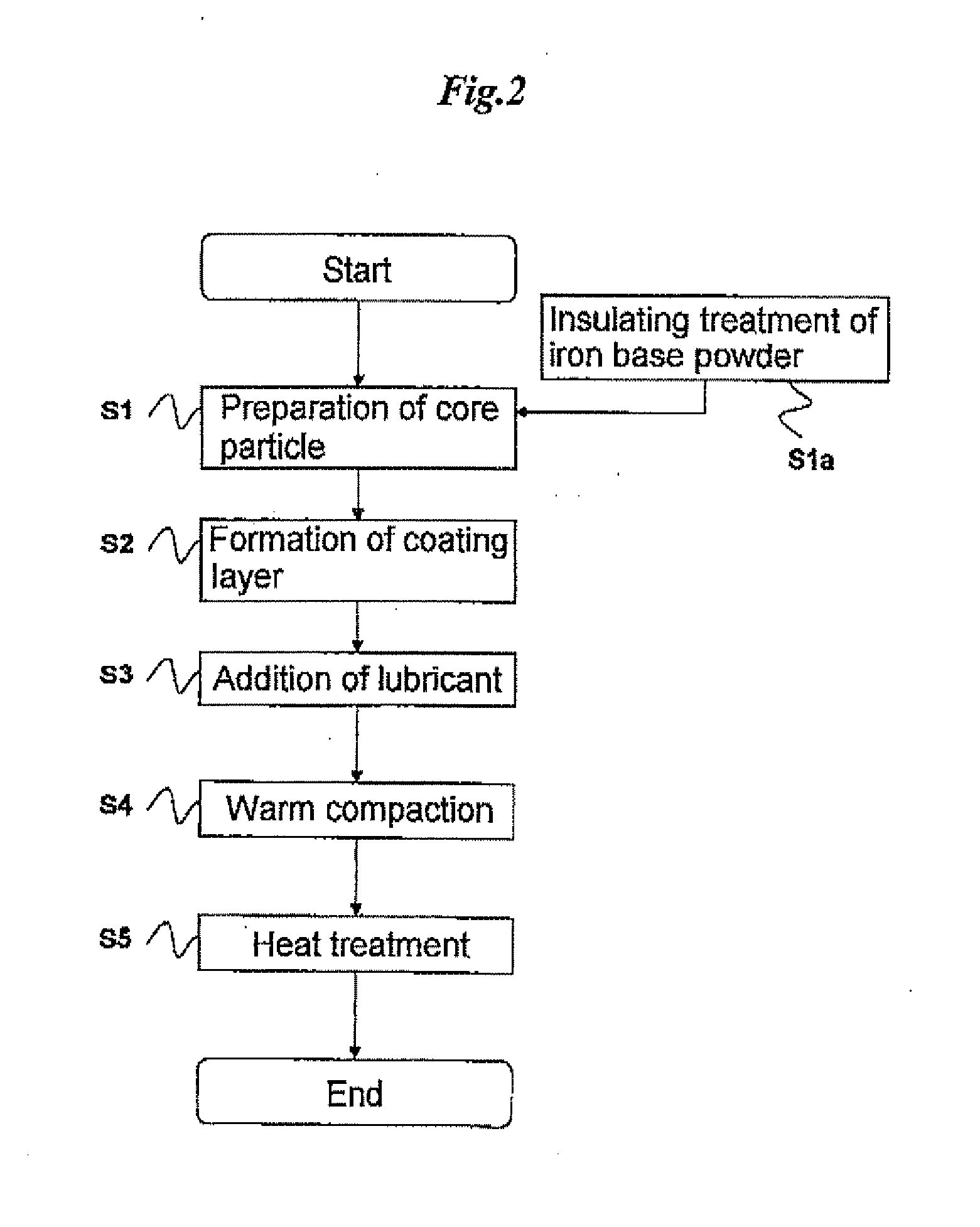Powder magnetic core
- Summary
- Abstract
- Description
- Claims
- Application Information
AI Technical Summary
Benefits of technology
Problems solved by technology
Method used
Image
Examples
example 1
[0076]First, as a core particle having: a soft magnetic particle containing iron as the main component; and an insulating layer formed on the surface of the soft magnetic particle, pure iron coated with an insulating layer (trade name “Somaloy 700” manufactured by Höganäs A B; the average particle diameter: 200 μm) was prepared. Next, solutions obtained by dissolving aluminum isopropoxide and zirconium tetra-normal-propoxide in toluene and a solution obtained by dissolving iron(III) acetylacetonate in toluene were prepared. Then the Al alkoxide solution and the Zr alkoxide solution were applied to the pure iron coated with the insulating layer in the ratios of Al atomic weight of 0.0035 mol % and Zr atomic weight of 0.0035 mol %, respectively, with respect to the Fe atomic weight contained in the soft magnetic particle, and then dried by heating. Then the Fe complex solution was further applied in the ratio of Fe atomic weight of 0.01 mol % with respect to the Fe atomic weight conta...
example 2
[0079]First, as a core particle having: a soft magnetic particle containing iron as the main component; and an insulating layer formed on the surface of the soft magnetic particle, pure iron coated with an insulating layer (trade name “Somaloy 700” manufactured by Höganäs A B; the average particle diameter: 200 μm) was prepared. Next, a solution obtained by dissolving aluminum isopropoxide in toluene and a solution obtained by dissolving iron(III) acetylacetonate in toluene were prepared. Then the Al alkoxide solution and the Fe complex solution were applied to the pure iron coated with the insulating layer in the ratios of Al atomic weight of 0.0035 mol % and Fe atomic weight of 0.02 mol %, respectively, with respect to the Fe atomic weight contained in the soft magnetic particle, and then dried by healing. Then the Fe complex solution was further applied in the ratio of Fe atomic weight of 0.01 mol % with respect to the Fe atomic weight contained in the soft magnetic particle and ...
example 3
[0081]First, as a core particle having: a soft magnetic particle containing iron as the main component; and an insulating layer formed on the surface of the soft magnetic particle, pure iron coated with an insulating layer (trade name “Somaloy 700” manufactured by Höganäs A B; the average particle diameter; 200 μm) was prepared. Next, solutions obtained by dissolving aluminum isopropoxide and zirconium tetra-normal-propoxide in toluene and a solution obtained by dissolving iron(III) acetylacetonate in toluene were prepared. Then the Al alkoxide solution, the Zr alkoxide solution and the Fe complex solution were applied to the pure iron coated with the insulating layer in the ratios of Al atomic weight of 0.0035 mol %, Zr atomic weight of 0.0035 mol %, and Fe atomic weight of 0.02 mol %, respectively, with respect to the Fe atomic weight contained in the soft magnetic particle, and then dried by heating. Then the Fe complex solution was further applied in the ratio of the Fe atomic w...
PUM
| Property | Measurement | Unit |
|---|---|---|
| Thickness | aaaaa | aaaaa |
| Thickness | aaaaa | aaaaa |
| Magnetic flux density | aaaaa | aaaaa |
Abstract
Description
Claims
Application Information
 Login to View More
Login to View More - R&D
- Intellectual Property
- Life Sciences
- Materials
- Tech Scout
- Unparalleled Data Quality
- Higher Quality Content
- 60% Fewer Hallucinations
Browse by: Latest US Patents, China's latest patents, Technical Efficacy Thesaurus, Application Domain, Technology Topic, Popular Technical Reports.
© 2025 PatSnap. All rights reserved.Legal|Privacy policy|Modern Slavery Act Transparency Statement|Sitemap|About US| Contact US: help@patsnap.com



